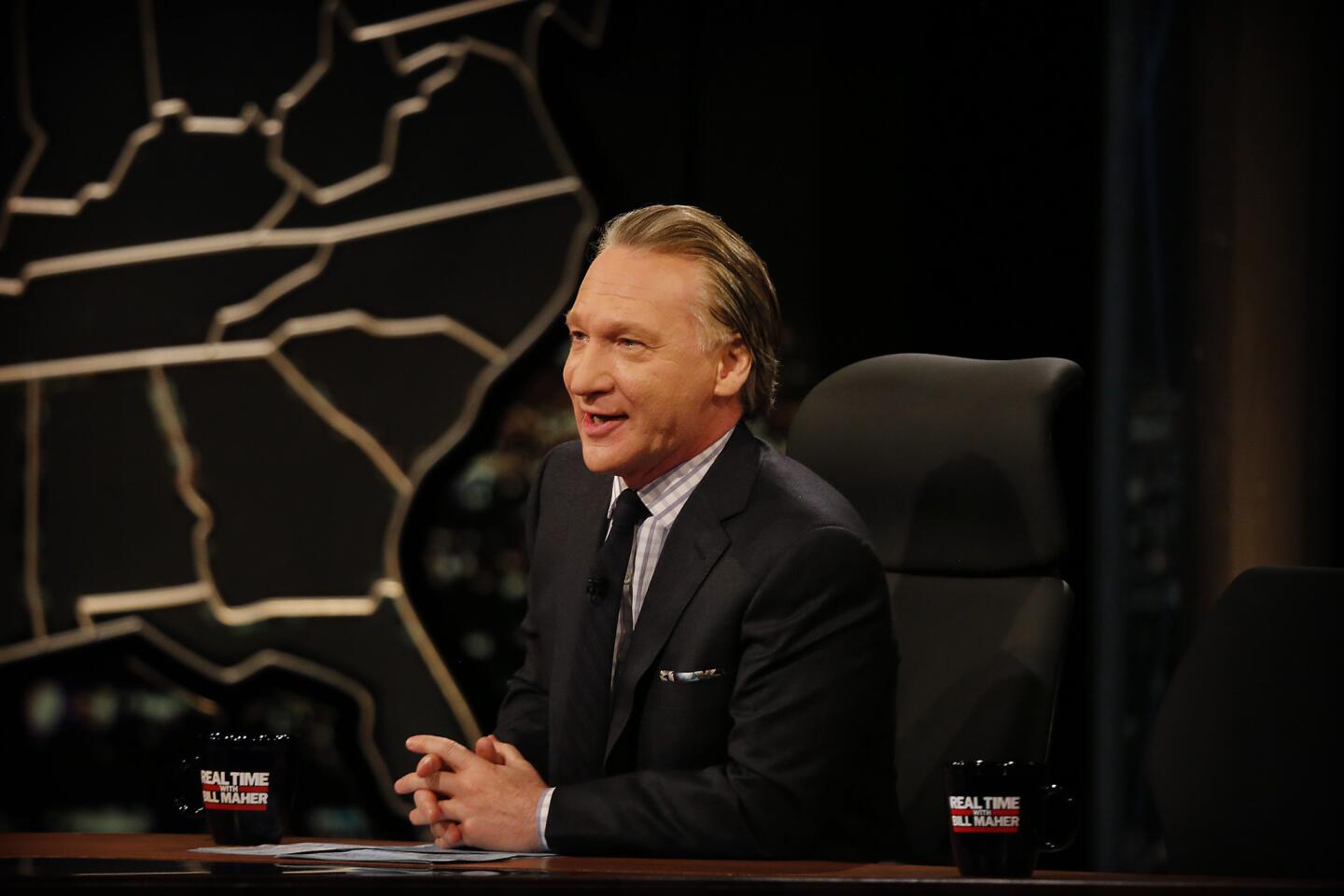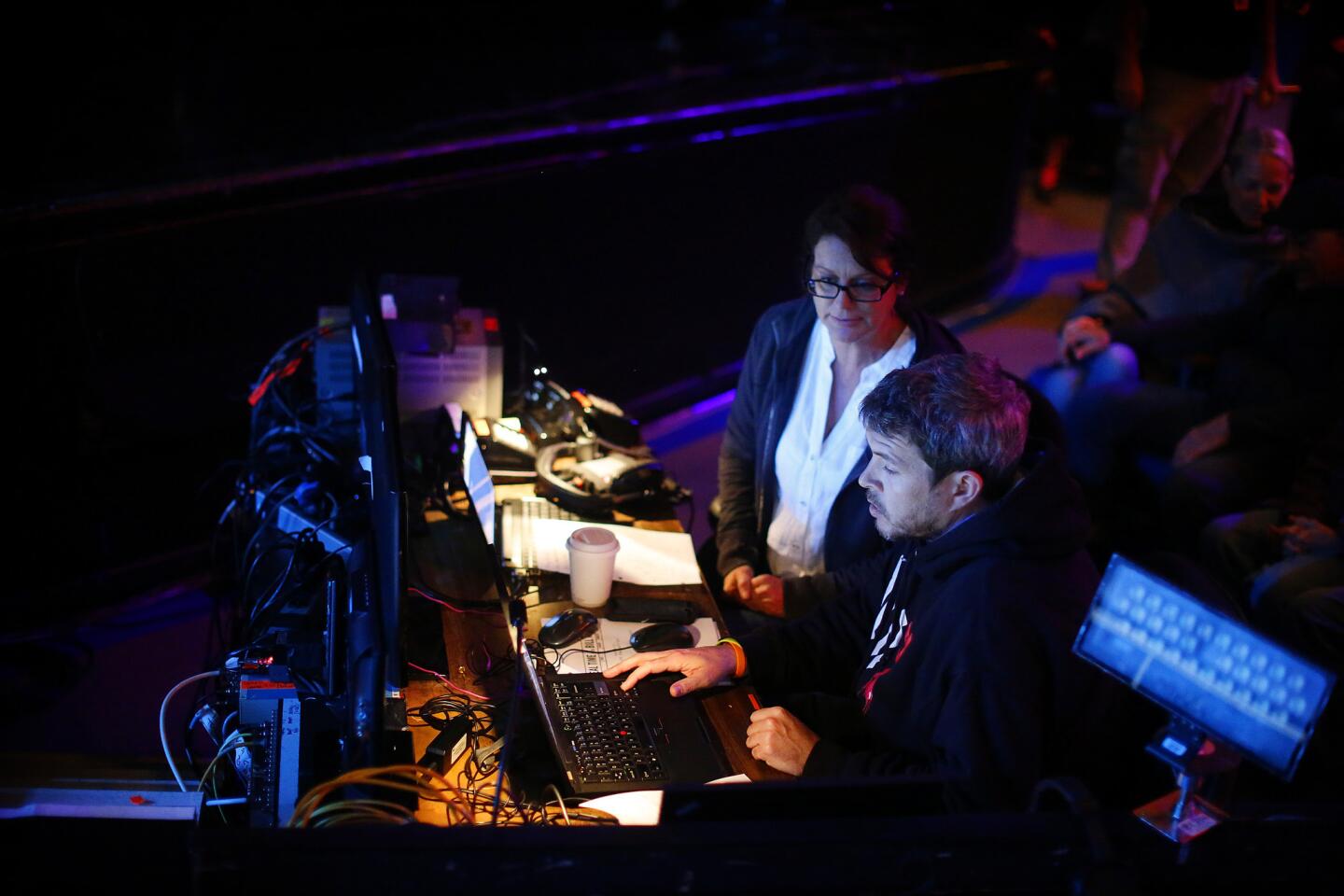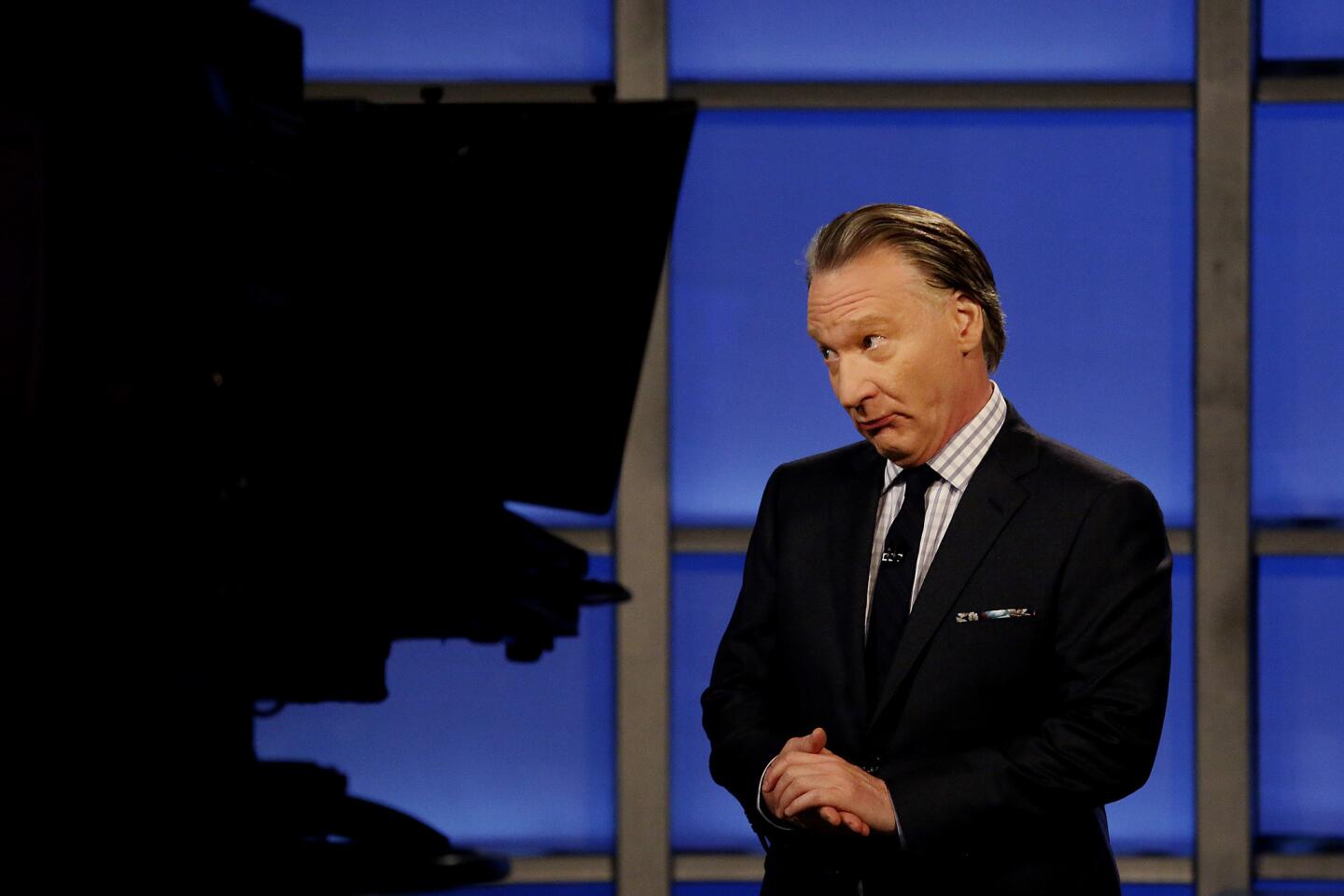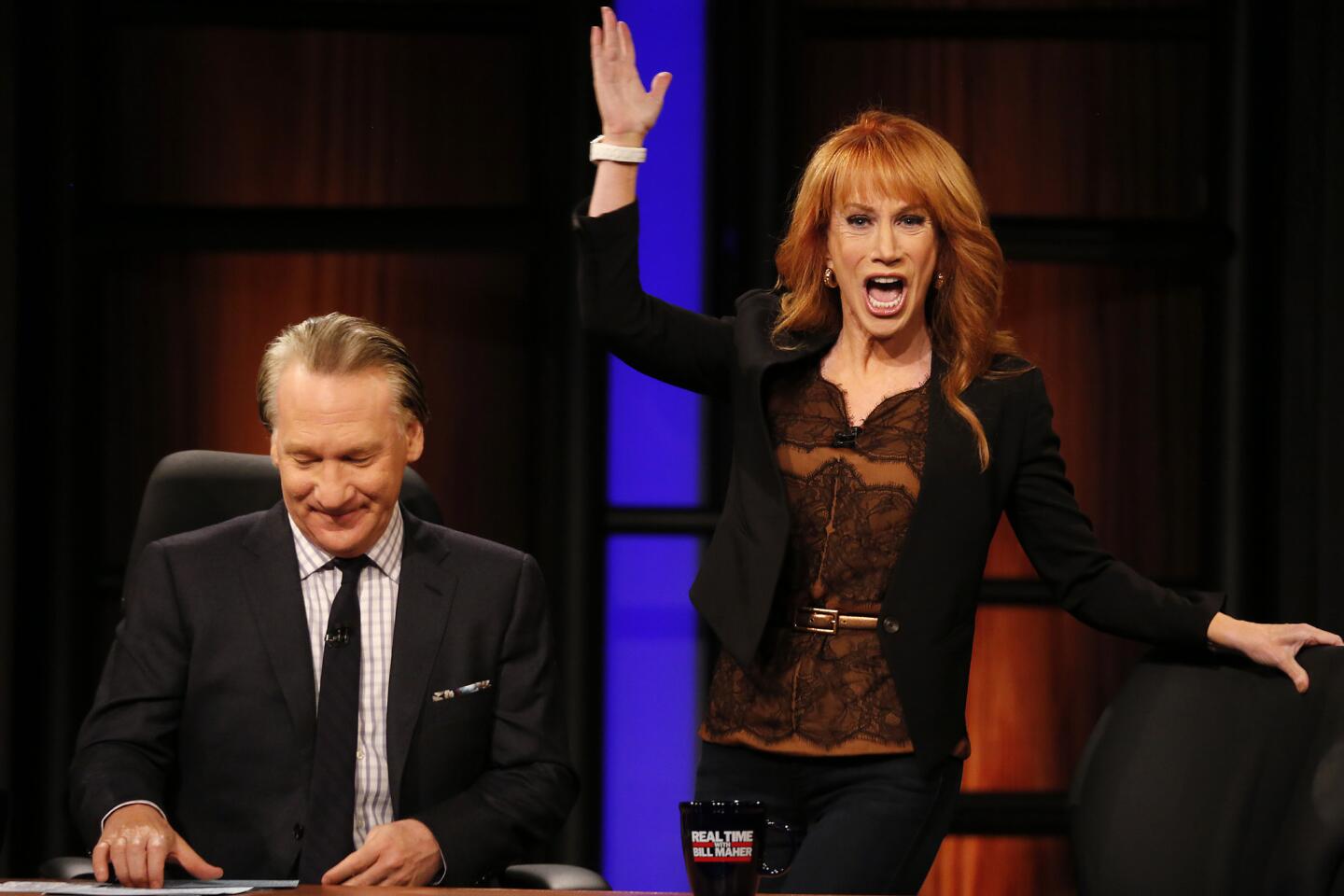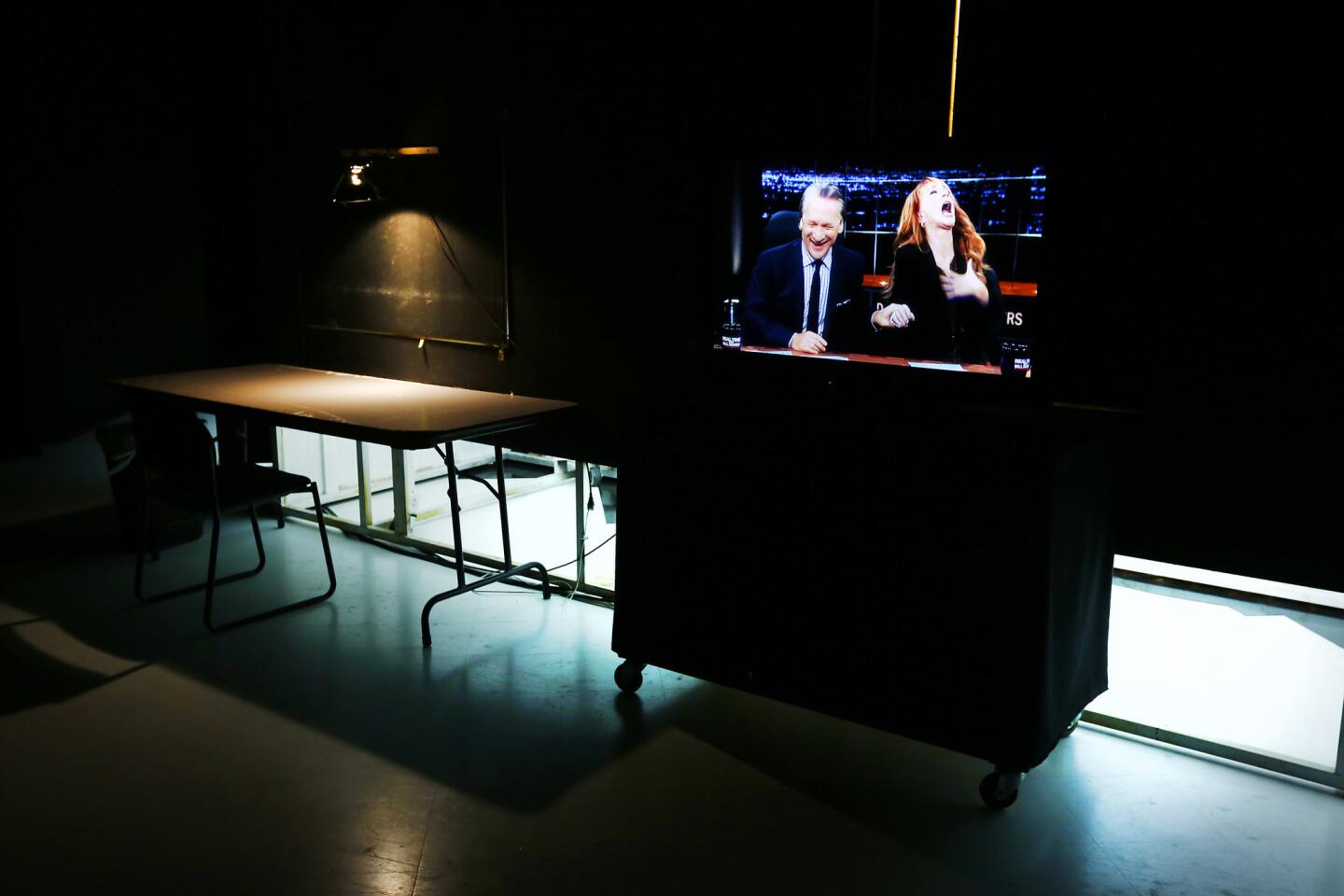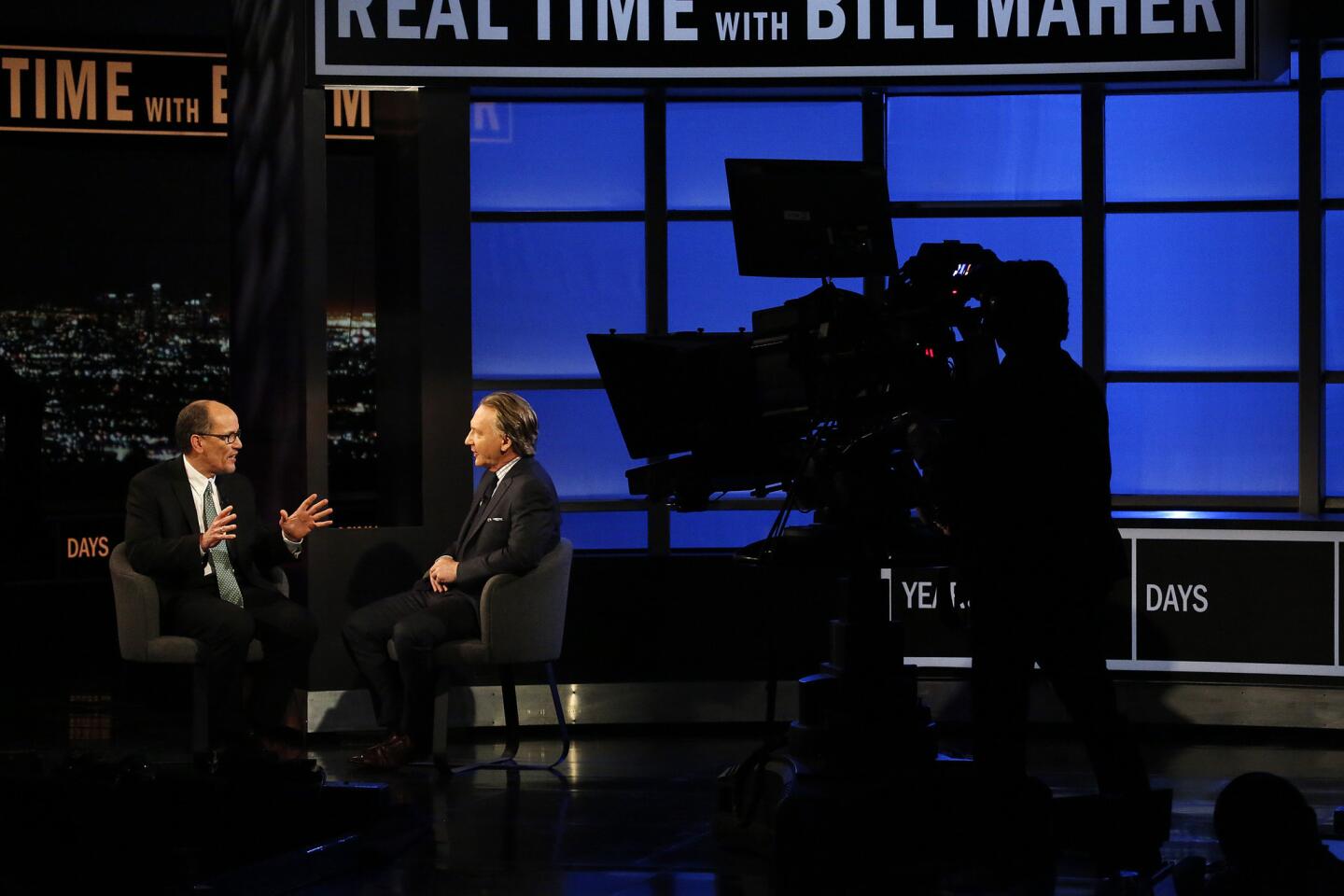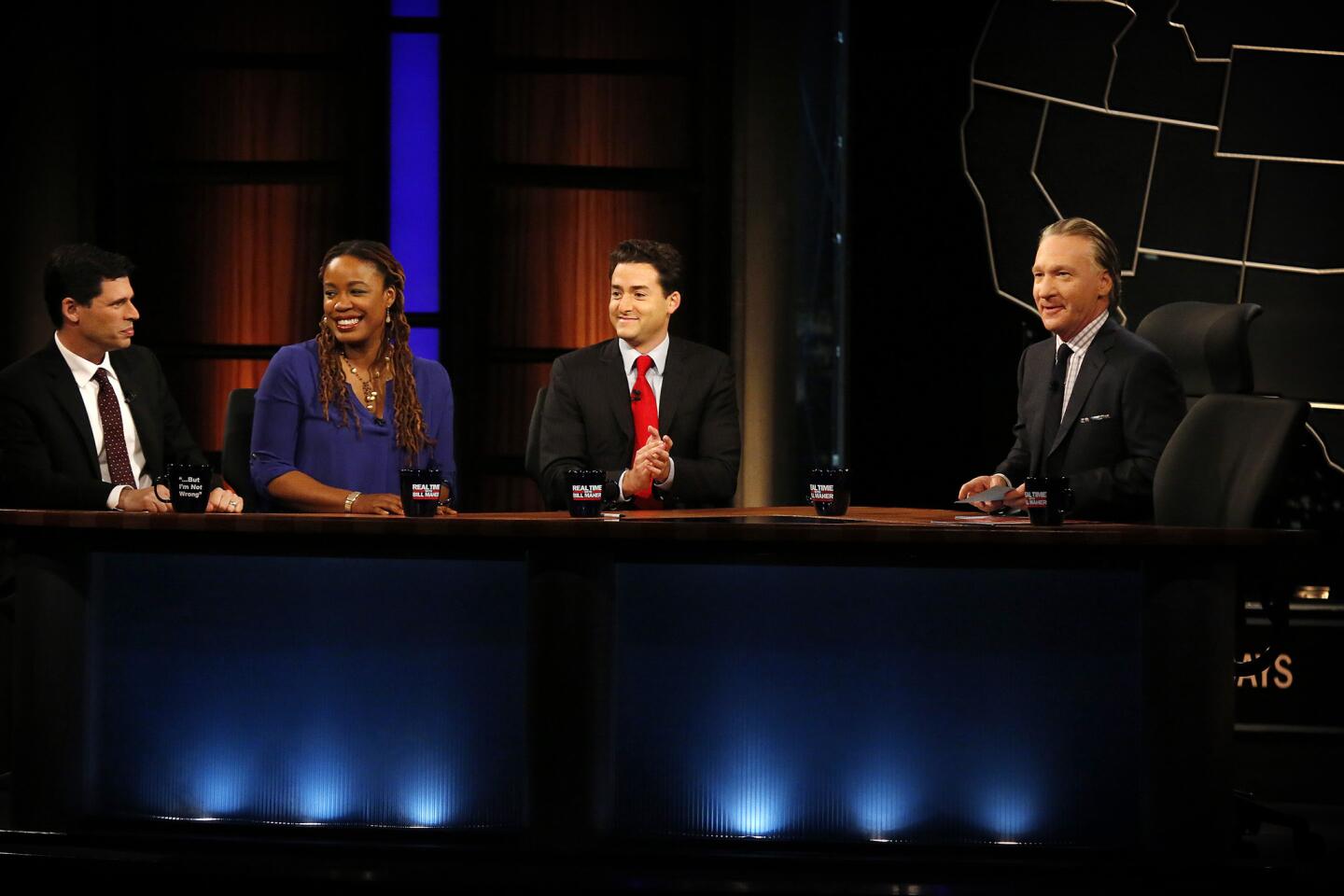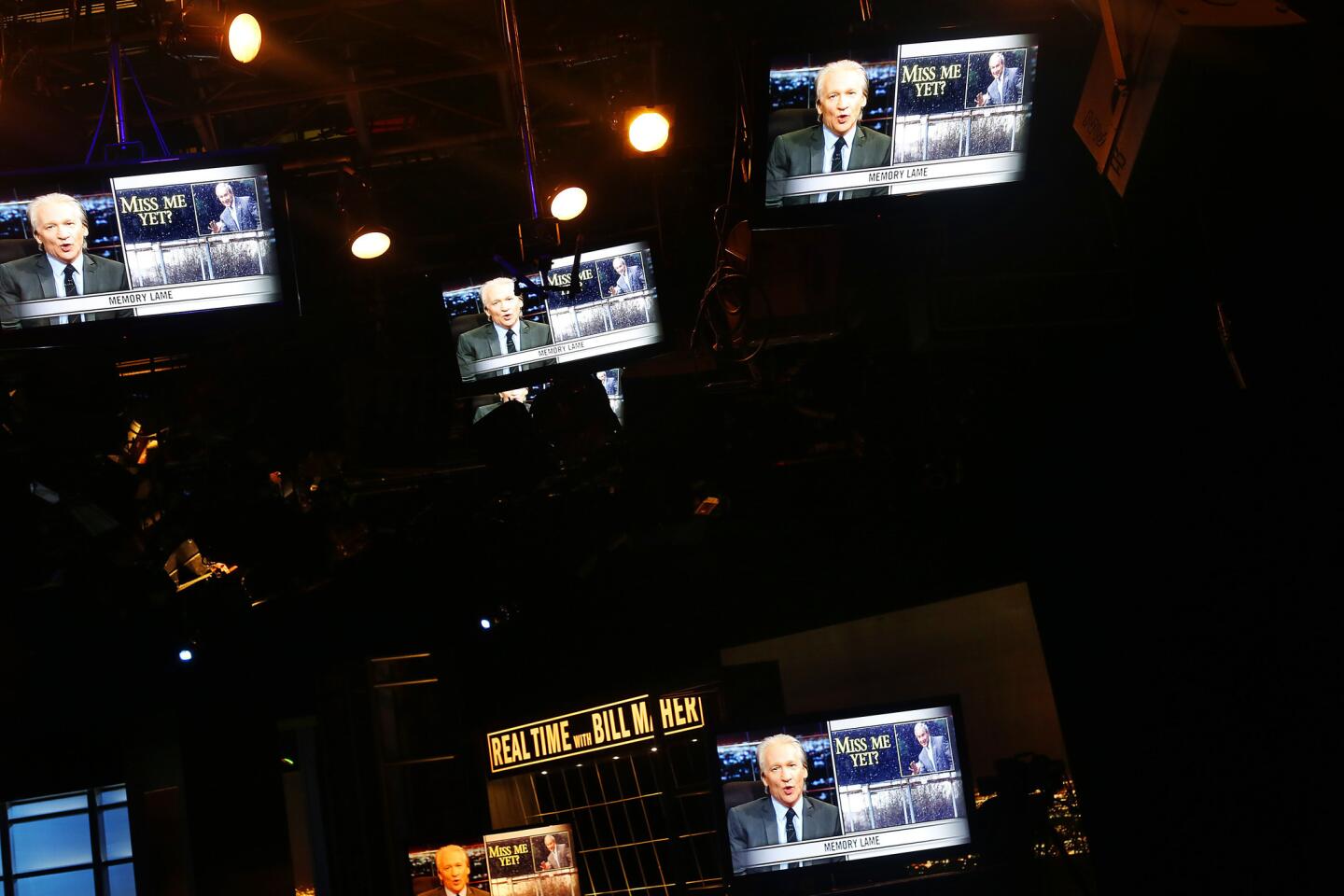Bill Maher keeps on doing it his way
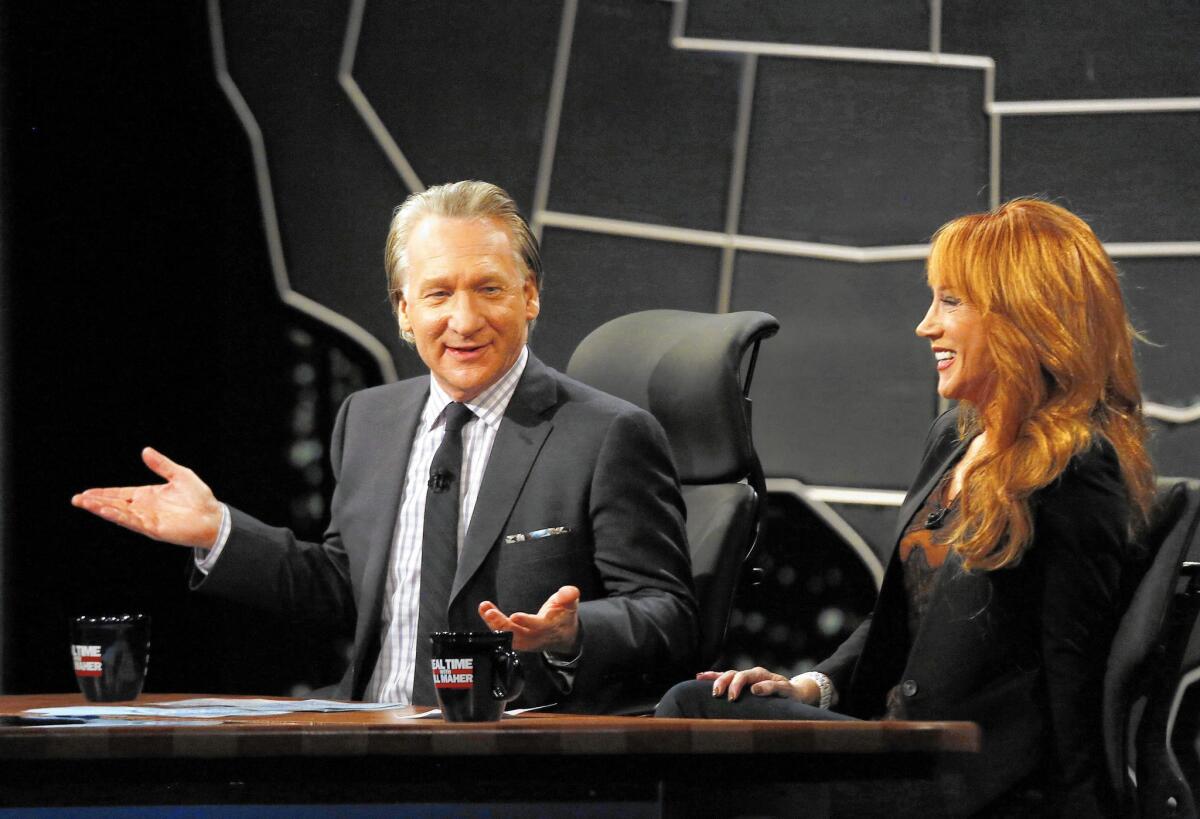
Bill Maher and comedian Kathy Griffin on ‘Real Time with Bill Maher.’
On a recent Friday afternoon in a bungalow on the CBS Television City lot, Bill Maher was leading a crowded meeting of writers and producers. In a few hours his weekly show “Real Time” would go live, and the cramped room — wall decorations: ironically displayed Southern-pride flag, whimsical portrait of Maher and a dog — filled with nervous energy.
The host, always ready with a quip on television, sat at the head of the table in near silence, letting his news-junkie writers hash things out. The subjects ranged from Hillary Clinton’s Iraq war record to potential tax reform to footage of college football on a screen overhead that would serve as a joke’s visual counterpoint.
Like us on Facebook to watch exclusive live video chats with TV stars from your favorite shows>>
Leaning forward in his chair, hand on coffee mug and eyes in distant contemplation, Maher took it all in without appearing to take it all in. Finally, in a knowing and unfussy tone, he spoke: “Why do we have so many pantless punters?” he queried, a remark that drew a few anxious laughs. Then the table grew temporarily quiet before turning to the ethics of Clinton’s behavior.
For the last 13 years on HBO’s “Real Time” (after nine years on ABC’s “Politically Incorrect”), Maher has been presiding with similar authoritativeness over what he sees as a feast of hypocrisy. For 35 weeks each year, he calls out politicians, religious leaders, demagogues, pundits — some of them, notably, his own guests — with a brand of humor that’s at once engaged and world-weary, and not infrequently infused with snark.
On this night, the conservative radio host and former Trump Productions chief Andy Dean is scheduled to come on — the first time any associate of the GOP front-runner has appeared on the program — and Maher would make sure he got the jabs-in-the-ribs “Real Time” welcome.

“I see you on television all the time. You seem like a nice person. I want to help you,” Maher says to Dean on air. The comment is partly sincere — it takes a certain kind of personality to volunteer for the largely liberal beatdowns — but it also sets up the unsparing comments to follow When Dean says Americans are fed up with small paychecks and thus “want a business leader,” one of Maher’s other guests, the liberal activist Heather McGhee, quips, “But the business leaders are the one who aren’t paying them!”
Labeling “Real Time” the best-kept secret in late night would be an overstatement; the show, as Maher and those who work on it are apt to remind, consistently has drawn around 4 million viewers an episode when various on-demand and delayed-viewing metrics are factored in. But perhaps because it arrives only weekly, or perhaps because Maher has been doing this so long he has become a kind of taken-for-granted fixture--or perhaps because he is simply more polarizing than others who occupy these chairs--he’s often been overlooked.
Yet Maher, in a cutthroat talk-show world that eats its young, has now outlasted many of the people who started as hosts before or soon after him — Jon Stewart and David Letterman and Craig Kilborn and Jay Leno and Tom Snyder and even the character of Stephen Colbert.
He has lasted so long, in fact, that the zeitgeist has now come to him. Ratings for “Real Time” have inched up, according to HBO, hitting an average viewership this season of 4.3 million, a nearly 10% gain over last year and the highest in many years. Maher hasn’t changed his on-screen persona much over the last two decades. But because his version of comedy is of a more firebrand sort than his counterparts — a person of relative privilege (he went to Cornell) speaking up for the common man, against a rigged system, and really against political correctness — it makes him an ideal entertainer for this age of populist anger.
“We’re living in a time when people are in love with Donald Trump or Bernie Sanders because they’re tired of politicians or people in the media telling them what they want to hear, mirroring back what they believe,” said Billy Martin, who serves as the show’s head writer and an executive producer. “And Bill never mirrors back what people believe.”
The Trump life
As he sat in his office, Maher was talking about his current go-to topic (when he’s not talking about his other go-to topic, his beloved New York Mets): Trump. Maher first resisted the candidate, then went after him with the zeal of a child knocking down a Weeble Wobble.
This moment has animated Maher because of its comedic possibilities. But it’s also clear that there’s a more complex reason that this season of truth-telling outsiders has galvanized him: He sees himself as one of them.
“In a strange way Trump’s got big … ,” Maher continued, making a characteristically anatomical reference that the candidate himself might appreciate. “He is a little like me. Because I’m not afraid to step on third rails, and Trump eats third rails for breakfast.”
Maher has been unabashed in his support of the upstart Sanders, even as the candidate’s appearance on “Real Time” stayed somewhat wanly on message. “I call it a new new deal. The Western European model--you pay more and you get more,” Maher said, explaining his Sanders support. “And look Hillary’s adopting it now too.”
. .

Maher’s political ideology might be described as “progressive with a side of stridency,” usually aimed at those he feels are not acknowledging the obvious. Most often this comes up with questions of religious, gender and ethnic sensitivities, which is why, in the now-infamous on-air debate in 2014 between Ben Affleck and controversial Islam-questioning secularist Sam Harris about whether radicalism was at the faith’s core, Maher didn’t stand back but actively sided with Harris — setting off a cataclysmic backlash on Liberal Twitter.
Progressive Web sites have often been critical of Maher moments they say are racist or misogynistic, as evidenced by such stories as Salon’s “7 Times Bill Maher Was A Straight-up Bigot” last year and a Daily Kos post that “Bill Maher Goes Full-Frontal Misogynist” after an anatomical epithet in a Tweet in 2014.
Maher remains unapologetic about such instances, “Everyone says, ‘I’m offended.’ Where did they get this idea that that means something?” he said as he sat in his office. “I’m offended by … all the time. I don’t make a federal case of it.”
Even in Hollywood, he said, this has become an epidemic, as Maher steps onto the entertainment industry’s own third rail. “This idea that the epicenter of racism is the Oscars is hilarious,” he said of the #OscarsSoWhite movement that seized attention this last awards season. “I’m a liberal, but I don’t have to apologize for that [sentiment]. ’12 Years a Slave’ won best picture. A lot of movies with black people have done well at the Oscars. I’m sorry that ‘The Martian’ was not black. But white people can go into space too.”
Some are simply offended by comments like this, coming down even harder on Maher perhaps because he’s a host with progressive bona fides. Others see such remarks as provocations for their own sake — a kind of ideological showmanship or, more calculatedly, an attempt to maintain his street cred by biting the liberal hand.
Those who work with Maher say he can revel in the agitated reactions. But it is not, they say, what motivates him.
“You see a smile on Bill’s face when he’s saying things people think he wasn’t going to say,” said Dean Johnsen, executive producer of “Real Time.” “But he’s not doing it for the smile. I think it just works for him — the more honest he is, the more successful he gets. It feeds itself.”
That candor has earned Maher a reputation among fans as a straight-talking disrober of the emperor’s new clothes, a fact evident by both the longevity of “Real Time” and the enthusiasm, in-house and on social media, of its audience. It has also though, perhaps, rubbed some in the industry the wrong way.
“Real Time” has been often recognized by mainstream Hollywood — and also consistently fallen short with it. For a 10-year span beginning in 2005, the show was nominated for the late-night Emmy alongside “The Daily Show With Jon Stewart,” a program with similar political-comedy ambitions. It lost to “The Daily Show” every time. Maher said he doesn’t see this as a disappointment, though his comments suggest it continues to gnaw.
“He obviously had a great run. Any show that gets people to be interested in news instead of ... is good,” Maher said of Stewart. “But do I think each year he won the Emmy and we didn’t it was because he was better? Of course not. I think we lost because we were better. Braver. People were not going to vote for the atheist. They weren’t going to vote for the guy who says something about Islam.”
He added, of the industry recognition. “It’s like in school—the teacher notices the second guy, not the instigator. If you’re ahead of the parade, people don’t notice—it’s like the tree in the forest. It’s the middle of the parade that wins the Emmy. But I’d always rather be in front of the parade.”
He continued, referring to Stewart: “The truth he spoke was truth to liberal power. I saw a liberal guy talking to a liberal audience making fun of Republicans. I do plenty of that. But it’s not all I do.”
Scott Carter, an executive producer who like many of his “Real Time” colleagues has been with Maher for more than two decades, said that the host is “one of the very few comics who’s comfortable criticizing his audience” — a recurrent idea and badge of honor among Maher associates. “He is not afraid to follow where he thinks the truth is, even if it leads him to the enemy camp or alienates some followers,” Carter said.
In a TV culture where intuiting an audience’s desires is practically religion, Maher is keen to be an apostate. “If there are going to be critics who say that it comes with a sense of hubris,” Martin said, “there are far more that see it as something attractive, because he’s pushing against thoughts and ideas he feels are wrong.”
Earlier that day, Maher had met with President Obama at a fundraiser at Tobey Maguire’s house. Obama’s first phrase to Maher, to hear the comedian tell it, was a smiling “am I going to get lobbied?” Obama has not been on “Real Time” since he took office, one of the few late-night shows he’s declined. Maher believes one reason may be because he knows harder questions would come up.
Maher looked around his office as he spoke. The room is sparsely furnished — most of the accessories are leftover props from past shows, like a campy Elvis painting. Maher decided against keeping too much around after an abrupt career change nearly 15 years ago. That’s when, just a week after 9/11, he infamously said on “Politically Incorrect” that the terrorists were many things but not, as some in the George W. Bush administration had it, cowards.
It was a statement that in retrospect may have been more semantic than incendiary. But it came with implications that many Americans, with soldiers about to be shipped overseas, were not eager to hear: Al Qaeda terrorists were willing to sacrifice for their cause too. (He did also suggest that Americans were cowards for lobbing cruise missiles from afar.) Maher was canceled by ABC almost instantly. A year later he had set up shop at HBO.
“People can get upset if they want,” Maher said. “But when I feel something, I feel it. Whenever I’m angry, I’m legitimately angry.”
Rat Pack modern
All terse efficiency in the backstage moments before “Real Time” goes live, Maher bounded out to the set (the same set as “The Price Is Right”), hair characteristically slick and jacket and tie impeccable — Maher’s on-screen appearance could be described as Rat Pack modern — and went right into the opening monologue.
His first lines were a gleeful expression of a great week that was. He didn’t have to tell the audience that he was alluding to Trump’s loss in Wisconsin; they already knew. He then followed that politically attuned reference with a joke about a hemorrhoid pillow, a stacked casino and a “bipolar 5-year-old” — his high-low formula in a nutshell.
Indeed, though the episode on this night is peppered with dirty and/or celebrity references, it usually came with an ideological undertone. A story, complete with alluring image, of a new perfume allegedly extracted from the bacteria of an Eastern European model’s genitalia offers a bevy of easy apolitical jokes, and one could imagine, as a kind of litmus test, what Leno, Letterman, Fallon and Jimmy Kimmel would do with it. Maher goes with asking if the company could “find an easier way to scare Muslims into going back to Syria.”
In rehearsal the day before he had workshopped a one-liner that “what happens in a voting booth, stays in a voting booth” — a vintage Maher joke, illuminating the tawdriness of the process by making a tawdry association.
The arrival of Trump and the current culture of crudeness has, in a sense, one-upped Maher and made his job more difficult, but it’s also made him more relevant than ever. You see, all of these R-rated jokes about high-minded subjects I’ve been making for years? his act seems to be saying. I wasn’t out of line — just ahead of my time.
Perhaps the world’s hardest-working stoner bachelor, Maher, at 60, has showed few signs of blunting his spikiness, or his workaholic routine.
He often emails staffers asking for economic reports or other wonkish material at 1 or 2 in the morning. Maher also does a live show without an earpiece, hoping to preserve a certain energy, with only a small monitor under his desk for emergencies onto which producers can type messages.
“Sometimes I think people forget we’re a show without a net,” said Sheila Griffiths, an intense but soft-spoken executive producer and one of the few high-ranking women who work on “Real Time.”
(Griffith believes booking guests, and particularly game conservatives, is the essence to a good episode. The show has not radically changed its format over the years, though it has made tweaks, such as adding a midshow guest to break up the constancy of an hour with no commercial breaks.)
Maher on this weekend will go to Denver, in keeping with his regular standup appearances the weekend after a show. At this point he obviously doesn’t need the money, but he likes the ability to try out new material and to meet a cross-section of Americans. Though many see Maher as grandstanding from his shiny Los Angeles set, one of his bete noirs is political comedians who’ve lost touch with the very people they’re allegedly standing up for.
Similarly sticking in his craw is a culture of copying among late-night hosts, now so common as to barely be noticeable. Maher’s goal is to be first to put forth an idea—a point that extends to something as simple as his smoking a joint on-air. “We did it on TV February but almost no one picked up on it—the tree in the woods again.”
The host is also rigorous about avoiding material others have done. Partly that’s the function of doing a weekly show on a Friday when everyone else has had a chance to weigh in. But it also comes from a belief that, at least by the standards of television gabfests, he can offer something that hasn’t been done before. A staffer is charged with combing through late-night shows throughout the week; if a joke pops up and is deemed too similar, it’s scratched from the rolls.
This is particularly true in the piece de resistance — not the punch-line-heavy New Rules. as you might think, but what writers call the “editorial,” a roughly three-minute closing monologue that aims to offer “a new way of thinking about an issue,” as Martin puts it. On this night Maher trots out that the GOP should simply give up on the election (the punting metaphor). It is heralded by many on the staff as a new idea, and though the notion the GOP could lose badly in November is not novel, the idea they should give up now, combined with a healthy dose of football references and informed digs (“Give the ball to your defense. You’ve got a great defense. By which I mean, you’re great at being obstructionist...”) does contain something of a fresh spin.
“I want to be unique. Because if you do something unique, they can’t get rid of you,” Maher explained of his philosophy, and reasons for following it.
Then as he segued first into and out of the subject of Sanders’ longstanding spiel coming into vogue, he added, “I want to hang around long enough too. Because if you hang around long enough, it works out. What is it they say? ‘First they ridicule you, then they ignore you and then they steal from you?’ I feel like I live that sometimes.”
MORE:
Amy Schumer takes on gun control again in ‘Welcome to the Gun Show’ sketch
Late night takes on Beyoncé’s ‘Lemonade,’ plus bonus Prince tribute
Anthony Atamanuik and James Adomian have turned ‘Trump vs Bernie’ into a comedy hit
The complete guide to home viewing
Get Screen Gab for everything about the TV shows and streaming movies everyone’s talking about.
You may occasionally receive promotional content from the Los Angeles Times.
